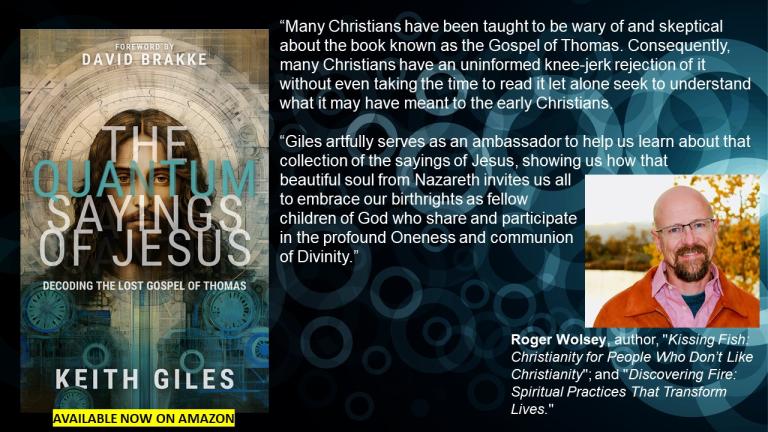Reading through the Gospel of Truth, one may discern a mixed message of Oneness and Connection with the Divine on the one hand, and Separation from the Father on the other. This bears further study and reflection before we move on to the rest of the text.
In Chapters 7 and 8 we begin to read statements that suggest the notion that some of “those who will learn [of the Father] are the living who are written in the book of the living” [7:3], and that, “those who are ignorant until the end are creatures of forgetfulness [who] will dissolve with it” [8:4].
What are we to make of these statements? Is Valentinus arguing that some are separated from the Father and will experience a form of annihilation or dissolution in the end? If so, what does that suggest about the original notions of all humanity existing in the Father and sharing the Father’s image?
Let’s take a look at a few reasons why that argument is logically inconsistent with what we read in the rest of the Gospel of Truth.
In Chapter 7, where the idea that “those who will learn [of the Father] are the living who are written in the book of the living” is first introduced, we also read this:
“Since the fullness of all things is in the Father, all things must go up to him….for they who are ignorant are in need, and their need is great, since they need what will fill them. Since the fullness of all things dwells in the Father, all things must go up to him and each one receives what is hers. He already inscribed these things, having prepared to give them to those who came from him.” [v. 5-9, emphasis mine]
It’s difficult to believe that the same person who wrote these verses above could think that there are some people will not come to know the Father and remain in ignorance to suffer the fate of dissolution. Why? Because those verses above affirm the notion that “…the fullness of all things is in the Father [and that] all things must go up to him.” If this is so, then where is there room for anyone to remain separated from the Father? Especially if that separation is merely an illusion that defies the reality of absolute Oneness and fullness in the Father?
It’s also logically inconsistent to argue that “those who are ignorant until the end…will dissolve…” when just a few verses prior to this the same author says that “all things must go up to him [the Father]…for they who are ignorant are in need…[of] what will fill them.” Are “they who are ignorant” not among those referred to in the phrase “all things”? Of course, they are. Those who are ignorant of the Father are the very ones whose ignorance and need draw them to the Father. Their ignorance of the Father does not separate them from God, it attracts them like the invisible waves drawing iron to a magnet. So, the idea that those who are ignorant of the Father can somehow remain ignorant and separated from God [in their minds] is ludicrous and entirely nonsensical if we follow the train of thought found right here in the Gospel of Truth.
What, then, are we to do with this verse that suggests otherwise? It’s a conundrum that one must grapple with philosophically, but the answers we gravitate toward may reveal more about us than we would like to admit. Certainly, one could take these verses at face value and conclude that Valentinus teaches that “in the end” those who remain in ignorance will “dissolve” along with it. Or, one could wrestle with these competing notions that I’ve highlighted above and conclude that those who are ignorant are the very ones being drawn to the Father by their ravenous need for what will fill them: the Father Himself, and that “since the fullness of all things dwells in the Father, all things must go up to him.”
So, we have a choice here. We can lean into the notion that we are among those who can see; who are not ignorant, and that those “other people” who refuse to agree with us are doomed to annihilation. Or, we can fully embrace the notion that everyone – regardless of their spiritual enlightenment or the lack thereof – are One with the Father and nothing can ever separate us from this reality. Not even our ignorance.
The real difficulty with finding a definitive answer is that I cannot dive into a lexicon to examine the original Coptic or Greek of this text to look for any potential nuance the translators may have missed in the verse that speaks of this dissolution of those who remain in ignorance. Perhaps the original language offers some possible re-translation that loosens the knot for us. If so, I am not sure how to determine that.
Looking at the verse in the English translation, it is possible to see how one might adjust the meaning to accommodate the more Universalist reading:
“…those who are ignorant until the end are creatures of forgetfulness [who] will dissolve with it” [8:4].
Perhaps it might be better translated as: “those who are ignorant until the end are creatures [whose] forgetfulness will dissolve with [forgetfulness].”
But, I cannot prove that. I can only point out that the verse, as translated for us in the English text we currently have available, is logically inconsistent with everything else affirmed in the Gospel of Truth. So, I must conclude that, either Valentinus hadn’t thought this idea out logically prior to writing that verse, or that verse isn’t correctly translated for us in the texts we have available.
Wherever you land on this issue, the determining factor at this point seems to leave us clinging to our preconceived biases. If we lean toward Universalism or Annihilation, our attention will be focused on one set of verses or the other; whichever confirms what we already believe.
What do you think?
**

The newest book from Keith Giles, “The Quantum Sayings of Jesus: Decoding the Lost Gospel of Thomas” is available now on Amazon. Order HERE>
Keith Giles is the best-selling author of the Jesus Un series. He has appeared on CNN, USA Today, BuzzFeed, and John Fugelsang’s “Tell Me Everything.”
He co-hosts The God Squad podcast, and the Heretic Happy Hour Podcast.



















